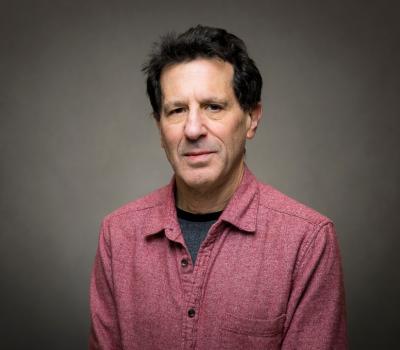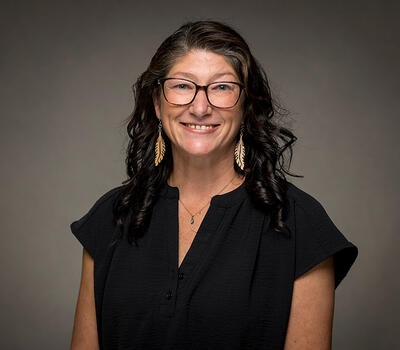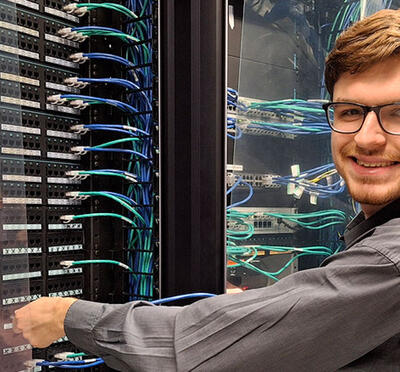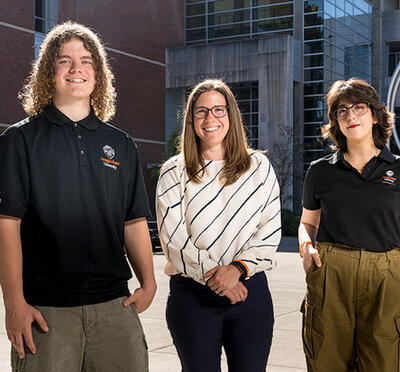CATALYST Scholars Program
The Catalyst Scholars Program was launched in 2020 by the College of Engineering at Oregon State University in partnership with the OSU Foundation and donors who are passionate about student success. The program aims to bridge the gap between traditional funding sources — loans, grants, scholarships, personal income — and the cost of attendance for students who are the first generation of their family to attend college, who demonstrate high achievement, and who have unmet financial need.
Bill Nicholson tells why he was inspired to donate to the Catalyst Scholars Program.
The college has seen rapid growth in recent years, both in the number of students and in their diversity. From 2009 to 2019, our enrollment more than doubled. Among current students, 20% are women, 19% are first-generation students, and 17% are from traditionally underrepresented groups.
Yet, nearly one in four engineering students has high financial need, as determined by Pell Grant eligibility. Nearly half of our Pell-eligible students are members of underrepresented groups, and most are also first-generation college students. While traditional scholarships and financial aid can help, they’re often not enough to see these students through to completion of their degree.
“I’m proud that the College of Engineering has made significant strides in building a more diverse and inclusive community,” said Scott A. Ashford, Kearney Dean of Engineering. “But we can do better, and we’ve made it a priority. The Catalyst Scholars Program sends a powerful message that an Oregon State Engineering degree is attainable for all.”
With an inaugural cohort of 10 students, the program will eventually serve up to 50 students per year. The scholarship helps propel qualified students across the finish line, with $8,000 in annual tuition and fee assistance. And, since students are more likely to graduate when they participate in activities that make their coursework come alive, it provides an additional $2,000 each year for each student to explore experiential learning activities such as undergraduate research, student clubs, internships, and leadership development.
Four ways to give
Want to make a difference in the education of a future engineer? The Catalyst Scholars Program offers a range of opportunities for donors to contribute.
Create a named fund with a current-use commitment of $50,000, payable over as many as five years. This will support a Catalyst Scholar from enrollment through graduation — including tuition and experiential learning support.
Establish a named endowment to support a Catalyst Scholar every year in perpetuity. A commitment of $250,000 and above, paid over as many as five years, will ensure the program thrives for decades to come.
Make a one-time or recurring gift, in any amount you choose, to the Catalyst Scholars Program fund to provide resources that support the program in a variety of ways.
Work with the OSU Foundation to support the program through a planned gift.
To learn more or to make a gift, please contact:
Scott Elmshaeuser
Director of Development
College of Engineering
541.737.3894
Scott.Elmshaeuser@osufoundation.org
Scott A. Ashford
Kearney Dean of Engineering
College of Engineering
541.737.5232
Scott.Ashford@oregonstate.edu
Ivan Chan
Ivan Chan chose to study computer science because of the personal, intellectual, and creative satisfaction it brings him. When writing computer code, he has to consider problems from multiple angles and determine the best way to attack them. He values the logical flow of thoughts, analysis, fine-tuning, testing, and ironing out the bugs. And then there’s the sense of achievement that comes with finding an elegant solution.
“It’s fulfilling and fun to deconstruct a problem, assess the scope and limitations of your solution, and ultimately test it. For me, it’s like solving a puzzle,” said Chan, who graduated from Gresham High School in Portland. The process can be time consuming and frustrating, but the reward of overcoming obstacles and finding a solution makes it all worthwhile.
Computer science also offers Chan limitless opportunities — another bonus of his chosen major.
“The field is always changing, and there are so many programming languages and so many applications to learn,” he said. “I can’t help but feel optimistic about working in the field. It’s so vast, and the work of computer scientists has a big impact on so many parts of people’s lives.”
Javier Garcia Ramirez
Javier Garcia Ramirez learned about teamwork on the soccer field.
“You get used to other people being there,” he said. “And there’s a mentor or coach bringing everyone together to reach a mutual goal.”
Garcia, a first-year computer science major minoring in business, is now applying those skills to his studies. The Catalyst Scholars Program allows Garcia to explore avenues he might not have considered otherwise.
“It’s really encouraged me to get involved in research and to know that I can do it as an undergraduate,” he said.
With that encouragement and funding, Garcia lined up a position working with Jennifer Parham-Mocello, assistant professor of computer science, beginning this winter. He’s confident that opportunities like this will help him gain experience working in a variety of settings, preparing him for a career as a software engineer and maybe, eventually, as a business owner.
“With computer science, I felt like I would be getting the technical skills I wanted for my career,” he said. “But I wouldn’t be exposed to how a business functions besides being an employee. With my minor, I’ll have more insight into what that looks like.”
Bryan Gregorio-Torres
When Bryan Gregorio-Torres got his first car during his senior year at Century High School in Hillsboro — a 2010 Honda Civic with about 90,000 miles — he discovered much more than newfound freedom. Fueled by his own curiosity, he headed down a path that led him to Oregon State. Driving the car was fun, but he soon wanted to know how it worked and how to fix it. His passion for automobiles and other powerful machines had kicked in, and that was a big reason he chose to study mechanical engineering.
Another reason was his father, who had emigrated from Mexico and passed down his considerable mechanical skills.
“He was also a huge car guy as a teenager,” according to Gregorio-Torres, “and he was always around to make sure I kept up with my studies.”
A few years ago, Gregorio-Torres visited his father’s hometown. It had limited running water that had to be boiled before drinking, bad roads, and old cars. The experience was humbling.
“It made me reflect on the privilege I have here, which I’ll never take for granted,” he said. “It makes me so grateful for my opportunity to go to OSU.”
Caden Hawkins
If the weather is nice, Caden Hawkins can be found on the tennis court. He says the sport, and his coach in particular, changed his life.
“Tennis forced me to overcome a lot of my younger life trauma and learn to rise above adversity,” Hawkins said. “But the biggest contribution to my success has been those around me lending me a hand when I needed it most.”
The Catalyst Scholars Program has done just that for the first-year electrical and computer engineering major. With tuition taken care of, he could afford a car to travel between Corvallis and his home in McMinnville. Through the program, he’s also become aware of other opportunities, like the National Academy of Engineering’s Grand Challenges Scholars Program, where he can use his engineering skills to connect with local communities.
“It’s not only helping me fund my schooling, it’s helping me fund my own exploration beyond my classes,” he said.
Hawkins wants to use his degree to make positive changes to the tech industry and envisions himself teaching after some time in the professional field.
“I had such amazing science teachers,” he said. “I want to be able to turn around and give back to the next generation, like them.”
Chloe Madden
Chloe Madden grew up in Florence and has always had a fascination with the Pacific Ocean.
“All I’ve ever wanted to do was learn more about it and explore its depths,” she said. “I hope to go out and do hands-on research with new robotic technology.”
Madden’s first experience with engineering was in a middle school class, where she got to build PVC robots.
“We took them to a competition where we did all these challenges,” she said, adding that she’s been in love with engineering ever since. Now, she wants to be a leader in the field, setting an example for other young women.
“As a woman, I have always faced prejudice for the things I want to do,” she said. “In addition, I have always been held back from doing what I love because of monetary issues.”
The Catalyst Scholars Program ensures the first-year mechanical engineering major will be able to continue working toward her goals.
“It’s truly a blessing, and I couldn’t be more grateful for this opportunity,” she said. “I hope that I can show just how strong I am and that I, in fact, can be an engineer.”
Hunter McKenzie
Hunter McKenzie grew up around heavy equipment. The first-year mechanical engineering student even rebuilt the engine of his four-wheeler.
“I was thinking about being a diesel technician, and then I realized I was more interested in being able to design the motor,” he said. “I want to improve emissions systems and make them more efficient.”
The Catalyst Scholars Program has relieved a huge financial burden for McKenzie and his family. He’s excited about the many doors it will open, including the opportunity to join the College of Engineering’s Leadership Academy.
This past fall, McKenzie heard from a variety of leaders through a required introductory class.
“They brought in industry representatives as well as professors at the university, and we could ask questions and just learn what life is like as an engineer,” he said.
McKenzie was particularly interested to hear from representatives of Daimler, the maker of several models of aerodynamic and fuel-efficient trucks. Overall, he found the advice helpful.
“Many of the speakers said to make sure you enjoy what you do,” McKenzie said. “That’s what I’m hoping to get with engineering.”
Zinn Morton
Zinn Morton loves physics and coding.
“Laying the code out structurally in my mind is something that’s really fascinating for me,” he said.
A first-year computer science major, Morton is the first person in his family to go to college. The Catalyst Scholars Program is helping him reach his goal of becoming a software engineer.
“Having that available for research projects and educational needs is going to be very helpful,” he said. “It’s meant a lot; without scholarships, I wouldn’t be able to attend school.”
Morton says he enjoys making friends and that his time as a member of Oregon State University Esports’ Overwatch team has stood out so far. It’s given him a chance to connect with students with similar interests, while also getting to check out video game design.
In the long run, he wants to use his problem-solving abilities to make technology more accessible.
“A lot of the time I see software that isn’t optimized, and it’s frustrating to use,” Morton said. “Coding makes a lot of things in life very practical. I found that to be interesting because I can help people out that way.”
Nestor Narvaez
Nestor Narvaez, a graduate of Albany High School, had the makings of an engineer long before he got to Oregon State. He’s strong in math and loves science and working with his hands. Right now, he’s rebuilding a 1984 Chevy Camaro. And he’s also very curious.
“How does chemistry work, how does electricity work, how do engines work?” he said. “I’m fascinated by systems where many components come together to make something bigger happen. And I always want to know more.”
He finds helping others equally fulfilling. Throughout high school, he volunteered as a math tutor, at food banks and homeless shelters, and to clean up trails. A career in engineering seemed like the perfect way to combine his technical and humanitarian pursuits.
“Through engineering, I can learn about the things I’m really interested in while developing skills that could one day help make life better for others,” he said.
Narvaez is considering a major in electrical and computer engineering, but that may change, because there are so many realms of knowledge he’s interested in exploring. But whatever direction he chooses, he plans to follow it toward a greater understanding about how the world works.
Michael Tran
Michael Tran was an exceptional student at Parkrose High School in Portland. He earned high grades. He carried out community service projects and participated in extracurricular activities through all four years. He played
on the top doubles pairing for the varsity tennis team, and he enthusiastically supported all of the other the sports teams. Yet when he got an email saying he’d been selected as a Catalyst Scholar, he didn’t believe it.
“I thought, ‘There’s no way this is real.’ I didn’t even know this program existed,” he said. “I kept wondering, ‘How did this happen?’”
To those who select the small group of scholars, the answer was pretty clear.
Tran is leaning toward majoring in industrial engineering. One reason is that it opens up so many career options and can lead to work that will allow him to achieve important personal goals.
“The idea that I could play a part in reducing waste production, cleaning up industrial processes, and making the planet a better place really appeals to me,” he said. “I can picture myself working in a field where I can make a difference like that.”
Dachan Yu
Dachan Yu wants to use his electrical and computer engineering degree to make computers more affordable. From his experience working at Fred Meyer, he got the sense that computer-shopping is a hassle for most people.
“I like the idea of creating useful products,” he said. “I’ve always liked tinkering with computers and electronics.”
Born in the U.S., Yu lived in China with his grandparents until he was 5, before moving to Portland and finally, Happy Valley. Growing up, Yu thought he might be a doctor, until he realized engineering was a way for him to combine his interests in technology with his desire to help people. Now, the Catalyst Scholars Program is helping Yu build the skills he’ll need as an engineer.
“Among other things, I was able to buy the computer I needed for school,” he said. “I really appreciate what this scholarship has done for me.”
In his free time, Yu likes to see what he can make with Arduino, an open-source hardware platform for electronics projects.
“It’s basically a board you plug components into and then program it to do whatever you want,” he said. “I like that you can actually hold it in your hand and see what you’ve created.”
YOU CAN DO THIS – AND WE’LL HELP
CONTRIBUTORS TO CATALYST SCHOLARS PROGRAM CHEER ON NEXT GENERATION
Tim and Ally Sissel
Tim Sissel (’97 B.S., Construction Engineering Management) grew up in Albany, Oregon, in a family of Beavers — all six members graduated from Oregon State University. He went on to become a founding owner and senior project manager of Fortis Construction Inc. While he won’t deny that hard work and good fortune contributed to his success, he is quick to acknowledge the role the university played in making him who he is today.
Beyond a desire to give back to the College of Engineering, Sissel says he was moved to support the Catalyst Scholars Program in particular because it gives a critical boost to students who demonstrate both high achievement and high financial need.
“To realize that we’re enabling them to experience what I experienced from ’93-’97, it’s a great feeling,” Sissel said. “They’re doing all the hard work. It’s going to be transformational, not only for them but their family and lineage as well.”
Sissel says he and his wife, Ally, were also motivated to help make engineering education more accessible to historically underrepresented groups.
“Ally and I, as well as the entire Fortis company, support diversity and inclusion in the construction industry and engineering in general. The first class of Catalyst Scholars is a very diverse group. That’s going to do great things for the College of Engineering, our industry, and the world.”
Bill and Kathleen Nicholson
Bill Nicholson (’80 B.S., Nuclear Engineering) recently retired as senior vice president of customer service in transmission and distribution for Portland General Electric, the culmination of a successful career spanning four decades. He and his wife, Kathleen (’80 B.S., Resource Recreation Management), see the Catalyst Scholars Program as a way to help other promising students make their own mark on the world.
“I hope to see a whole lot of students who otherwise maybe wouldn’t have been able to go to college achieve their dreams,” Nicholson said. “But more than that, I want to see them make a positive impact on our community. I especially like the fact that this program is focused on high-achieving students who have the most financial need.”
When he was a sophomore at Oregon State University, Nicholson received a scholarship that covered about a third of his cost of attendance.
“It was amazing. I really felt that, if someone invests in me, that is a motivator to excel,” he said. “It definitely made me want to get to the finish line and graduate.”
Nicholson points to the experiential education component of the program as one of its key distinguishing features.
“The Catalyst Scholars Program encourages students to get engaged
in their community,” he said. “We know that improves graduation rates, when students are involved in more than just the classroom.”
Dick and Gretchen Evans
Dick Evans (’69 B.S., Industrial Engineering) spent five decades in the aluminum industry in a career that started with internships while he was still a student at Oregon State University. Shortly after he received his MBA from Stanford, Kaiser Aluminum sent Dick — and his wife Gretchen (’69 B.S., Elementary Education) — to Africa, where he ran a large smelting plant in Ghana. That experience left a big impression about how the majority of the world’s population lives and works, and the difference that education can make.
“Economically, there’s an inequality in opportunity, and it’s widening,” Evans said. “Although Oregon is not West Africa, it certainly has some challenges in terms of access to education.”
Evans sees the Catalyst Scholars Program as a way to help overcome those challenges.
“It provides a bridging mechanism that can help first-generation students, underrepresented minorities, and others who may be highly capable and motivated — but lack opportunities available to more fortunate students, because of their economic differences,” he said.
It was the Evanses who came up with the idea to make the Catalyst Scholars Program itself more accessible to donors, by creating incremental funding units of $50,000 each, so that a broader range of donors can actively participate.
“This way we can engage a broader group of donors than we could by asking only for much larger endowments,” Dick Evans said.
Jim and Terrie Piro
Jim Piro (’74 B.S., Civil Engineering) spent 43 years in the public utility sector, retiring from Portland General Electric as its president in 2017. Throughout his long career, and continuing in retirement, he has remained a passionate supporter of public education. He has served as chair for the STEM Investment Council for the state of Oregon and on the boards of several organizations, including the
OSU Foundation.
Piro and his wife, Terrie, had already endowed a scholarship in the College of Engineering when the college approached them about supporting the Catalyst Scholars Program. For the Piros, it just made sense.
“Rather than asking students to put together piecemeal funds from various sources, this one scholarship will meet the needs of students for their entire time at Oregon State,” Piro said. “That certainty will make it easier for them to succeed.”
Piro sees the program as an investment in Oregon’s future.
“We don’t graduate enough engineers from Oregon to fill the jobs we have here,” he said. “We’re trying to get more Oregon kids interested in STEM fields. The Catalyst Scholars Program is a great start.”






